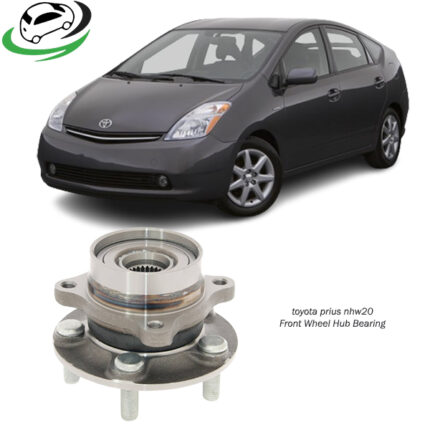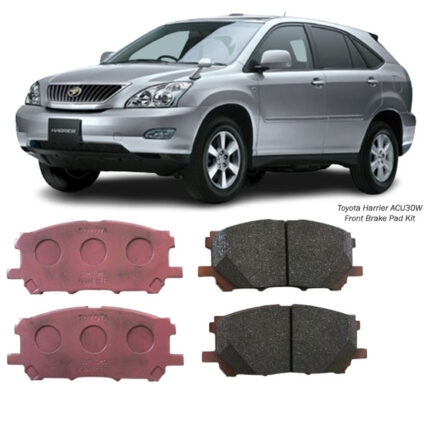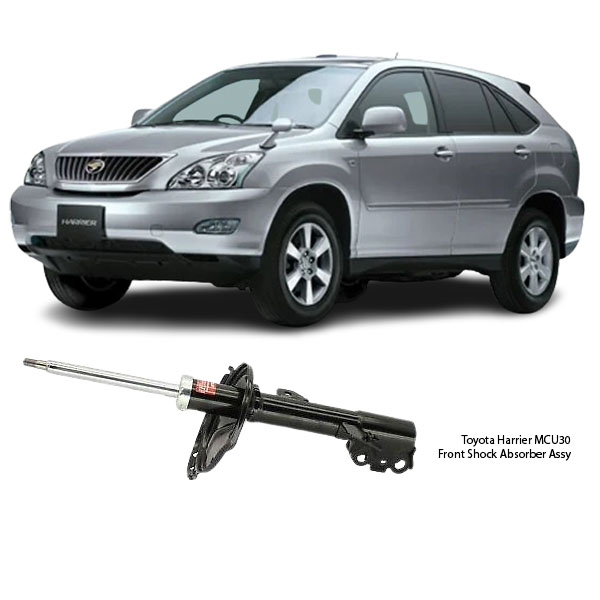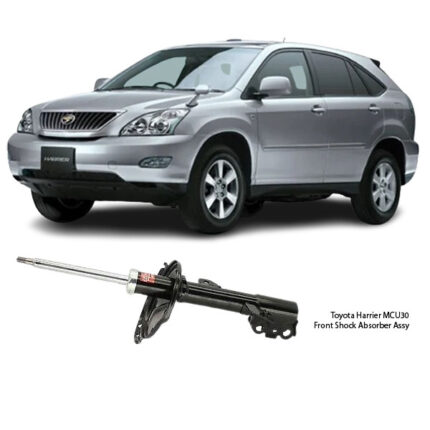-5%
Get Toyota Harrier Mcu30/Acu30 Front Shock Absorber Assy 334399 in Kenya
A front shock absorber assembly is a crucial component in your vehicle’s suspension system, ensuring a smooth, stable, and safe ride. It absorbs road shocks, reduces vibrations, and enhances vehicle handling by keeping the tires in contact with the road surface.
Whether you’re a car enthusiast, a DIY mechanic, or simply looking to replace your front shocks, this guide covers everything about front shock absorber assemblies, including their function, types, signs of wear, replacement process, and maintenance tips. Let’s dive in!
What is a Front Shock Absorber Assembly?
A shock absorber is a hydraulic or gas-filled device that dampens and controls suspension movement. The front shock absorber assembly includes:
Shock Absorber (Damper) – Absorbs and dissipates energy from road impacts
Spring (Coil Spring or Strut Spring) – Supports the vehicle’s weight and absorbs shocks
Mounts & Bushings – Connects the shock to the chassis and reduces vibrations
Located at the front suspension, these components work together to ensure a smooth and stable ride, improving vehicle control and comfort.
Functions of a Front Shock Absorber Assembly
The front shock absorbers play a vital role in your vehicle’s overall performance by:
Absorbing Bumps & Vibrations – Reduces the impact of potholes, speed bumps, and rough roads
Enhancing Stability & Handling – Keeps the tires firmly planted for better grip and control
Preventing Excessive Body Roll – Reduces vehicle sway during turns, braking, and acceleration
Minimizing Tire Wear – Ensures even tire contact, preventing premature tread wear
Improving Braking Performance – Maintains traction by preventing excessive weight transfer
Without properly functioning shock absorbers, your ride becomes uncomfortable, unstable, and unsafe.
Types of Front Shock Absorbers
There are several types of shock absorbers, each with unique features and benefits:
Hydraulic (Oil-Filled) Shock Absorbers
Uses hydraulic fluid to dampen vibrations
Affordable and widely used in standard vehicles
Smooth performance but less responsive than gas shocks
Gas-Charged Shock Absorbers
Contains nitrogen gas to prevent foaming in hydraulic fluid
Provides better stability and quick rebound control
Ideal for high-speed and performance vehicles
Twin-Tube Shock Absorbers
Features an inner and outer tube for efficient damping
Common in passenger cars and light trucks
Offers a balance between comfort and performance
Monotube Shock Absorbers
Single tube design with gas-charged chamber
Better heat dissipation and faster response
Used in high-performance and off-road vehicles
Coilover Shock Absorbers
Integrates a coil spring around the shock absorber
Adjustable ride height and stiffness
Preferred in racing and performance tuning
Knowing the right type for your vehicle ensures optimal performance and ride quality.
Signs of a Worn-Out Front Shock Absorber
Shock absorbers degrade over time, and worn shocks affect handling, comfort, and safety. Look out for these warning signs:
Excessive Bouncing – Car continues bouncing after hitting a bump
Poor Steering Response – Loose or unstable steering at high speeds
Longer Braking Distance – Takes longer to stop due to reduced traction
Uneven Tire Wear – Tires show cupping or bald spots
Leaking Fluid – Visible oil leakage from the shock body
Clunking or Knocking Noises – Metal-on-metal sounds when driving over bumps
Vehicle Nose Dives – Front of the car dips forward when braking
If you experience any of these issues, it’s time to replace your shock absorbers!
How Often Should You Replace Front Shock Absorbers?
Shock absorbers don’t last forever. On average, they should be replaced every:
50,000 – 100,000 km (30,000 – 60,000 miles) under normal driving conditions
30,000 – 50,000 km (18,000 – 30,000 miles) if driving on rough roads frequently
Always check your vehicle manual for manufacturer recommendations.
How to Replace Front Shock Absorbers?
Tools Needed
Jack & Jack Stands
Socket Wrench & Ratchet Set
Pry Bar & Hammer
Torque Wrench
New Front Shock Absorber Assembly
Step-by-Step Process:
Secure the Vehicle – Park on a level surface and lift the front with a jack.
Remove the Wheel – Use a wrench to loosen and remove lug nuts.
Locate the Shock Absorber – Find the shock assembly behind the wheel.
Unbolt the Old Shock Absorber – Remove the lower and upper mounting bolts.
Install the New Shock Absorber – Position the new assembly and tighten the bolts.
Reassemble & Test Drive – Put the wheel back, lower the car, and check for smooth operation.
Pro Tip: If replacing one shock absorber, it’s best to replace both front shocks for balanced performance.
Maintenance Tips for Longer Shock Absorber Life
Check for Leaks Regularly – Inspect for any signs of fluid leakage
Avoid Overloading Your Vehicle – Excess weight puts extra strain on shocks
Drive Carefully on Rough Roads – Slow down on potholes to reduce impact
Inspect Suspension Components – Worn-out bushings and mounts can affect shock performance
Get Wheel Alignments – Misalignment can cause uneven wear on shocks and tires
By following these simple maintenance tips, you can extend the life of your shock absorbers and enjoy a smooth, stable ride.
Where to Buy Front Shock Absorbers?
You can purchase genuine and aftermarket front shock absorber assemblies from:
Authorized Dealerships – Genuine OEM parts with manufacturer warranty
Auto Parts Stores – Popular brands like KYB, Bilstein, Monroe, and Sachs
Online Retailers – Amazon, eBay, RockAuto, CarParts.com
Tip: Always check for compatibility with your vehicle’s make and model before purchasing.
Follow us on Facebook for more parts.




